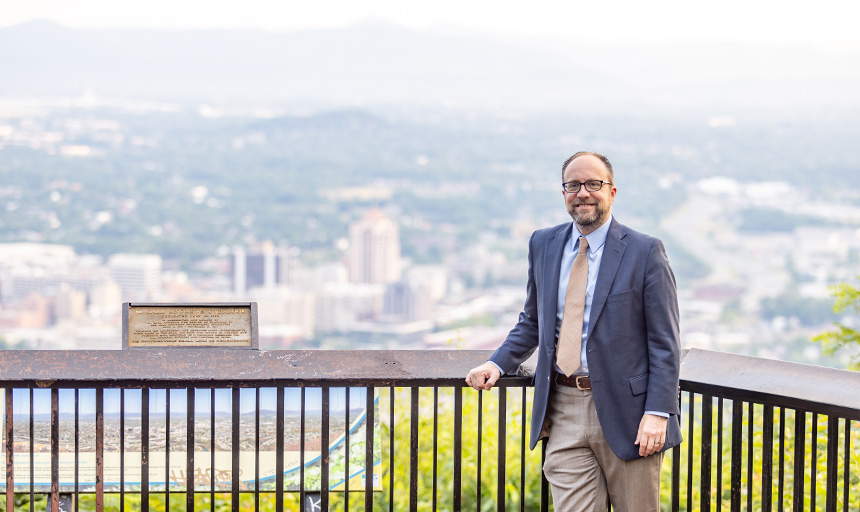
John Hull’s roadmap to economic development leader and million-dollar deal maker started in an unexpected place — geography class.
It was in a course at Roanoke College that Hull, now head of the innovative Roanoke Regional Partnership, discovered a passion for data-driven strategy that would define his career.
“I realized you could understand a place more deeply by knowing its data, the facts and figures underneath everything, and that just fascinated me,” he said. "It all began for me at Roanoke College.”
Hull ’04 took geography with adjunct Wayne Strickland and produced a paper on demographic trends so meticulously researched that he was recruited for an internship at Strickland’s primary gig with the Roanoke Valley-Alleghany Regional Commission, a planning coalition where Strickland was director.
That led to a job after graduation and later an offer to join the Roanoke Regional Partnership, a key player in every major economic development initiative in the region. In 2021, Hull rose to executive director of that group, working with government and industry to chart a path that expands the region’s reputation for being business-friendly, of course, but also worker-, family- and innovation-friendly.
It’s a complicated alchemy. But the efforts are paying off — just look at the data. Last year alone, deals with Wells Fargo, Altec Inc., New Belgium Brewing and more created a record-setting 1,400+ jobs and $165 million in capital investment.
Already, plans are in motion to build on those successes. This is just the start of what’s possible, Hull said. “Our time is now. Our regional renaissance is just beginning.”
On how the Roanoke region revolutionized its image — years ahead of its competition
Going back 20 years, if Roanoke had an identity, it was one of being a rail city or a train city. Now, it’s definitely the outdoors. Outside Magazine named us one of the nation’s best mountain towns. We’ve introduced big events like Go Fest and the Blue Ridge Marathon. We’ve been investing in cycling trails, greenways and paddling opportunities. The region has a new story now. It’s one focused on our outdoor and creative culture, and that’s something the community has fully embraced and something that has been able to attract new people to our area. And it was possible because of forward-thinking people across the region who came together to create partnerships and expand our sense of what we could be.
During that time, there were also leaders who challenged us to think of economic development as more than just attracting new businesses. That was really visionary, I think. We were on the leading edge of the talent attraction component of the work, which has become so important. And we continue to evolve and invest in that. We’ve got the Get2KnowNoke initiative, the Roanoke Region Professional Network quarterly socials and the Onboard|ROA summer program, which is a young professionals development program. All of that blends together those themes of the outdoors and fun as we introduce young new talent to our region.
On how the talent wars put college students front and center in economic development
Communities everywhere are in a competition for talent. There are more jobs out there than skilled workers to fill them. So, it becomes really important to have strong talent attraction and retention strategies because it directly affects a region’s ability to compete and to grow.
Students who choose our region for higher education are an important demographic in that work. It’s a prime opportunity to retain young talent that already likes our area and feels connected to it. We have a lot of potential on that front in particular here, and that’s backed up by the data. We have more enrollment and more graduates on a per capita basis than Austin, Texas, Boston or the Research Triangle. The I-81 corridor is rich with higher education resources, and that’s an asset.
On why he feels called to economic development work
For me, economic development is about the creation of opportunity. I grew up in a blue-collar community in Southwest Virginia – Carroll County – and I know what it’s like when places are experiencing job losses and economic challenges. I’ve always had strong roots and a deep love for this part of the world. The work I get to do is about helping the people and families in our region thrive. And that’s really important to me.
On how an elective course unexpectedly helped him find his path
In that geography class, I really stumbled on an interest and a professional opportunity I didn’t even know existed before. Not many kids dream of being a regional planner or an economic developer, because we don’t grow up knowing about those careers in the same way as others. I got to discover them through my time at Roanoke College. I ended up taking three or four geography classes, and developed research and analytical skills that have served me well.